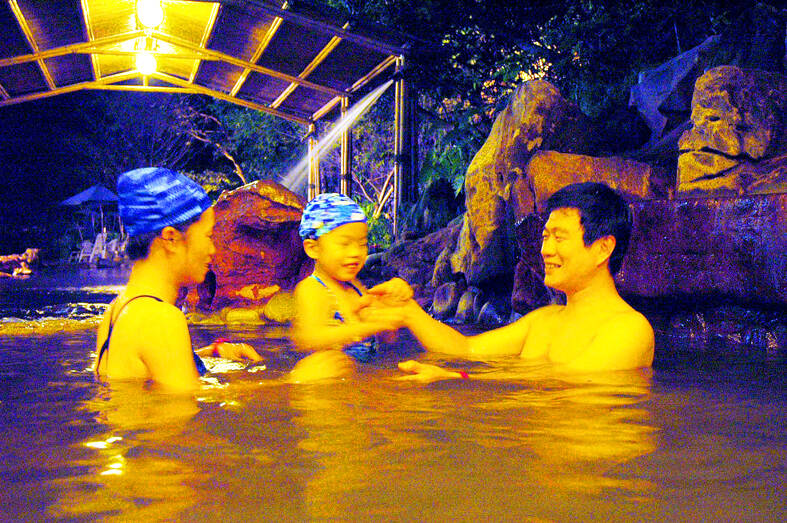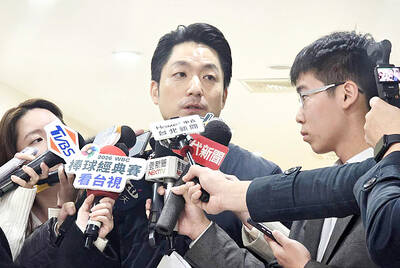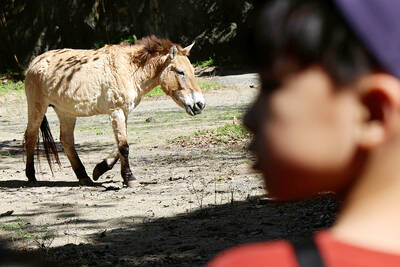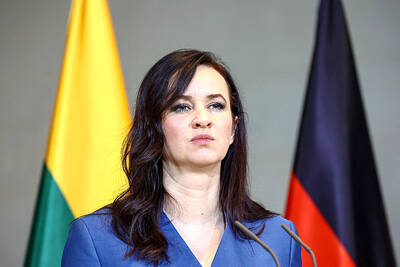People should avoid taking hot spring baths when they are too full or hungry, and remember to control the water’s temperature and to keep warm after getting out of the pool, a doctor said.
Hot spring baths can warm the body and promote blood circulation, but there are a few things to keep in mind, urologist Kao Ming-hung (高銘鴻) wrote on Facebook.
People should avoid taking hot spring baths right after eating, as ingredients that contain alcohol or tend to irritate the stomach could increase one’s heart rate, he said.

Photo: CNA
An increased heart rate and stimulation by the warm waters could raise the risks of a heart attack or stroke, he said.
Taking hot spring baths on an empty stomach is also not recommended, as a low blood pressure could lead to dizziness or other symptoms, he said.
The ideal temperature for hot springs is between 38°C and 42°C to help relax the muscles while avoiding burns, he said.
Kao suggested getting out of the water for a short break after dipping for a maximum of 15 minutes to avoid dehydration or increasing the burden on the heart.
Soaking one’s feet in the hot spring first to test the temperature before immersing one’s body in the pool is recommended, he said.
Elderly people with diabetes or peripheral vascular diseases should not be left alone as they might be less sensitive to temperatures, he said.
The Health Promotion Administration also put forward recommendations on how elderly people and people with cardiovascular diseases can enjoy hot springs.
They should limit bathing time to 15 minutes to avoid acute cardiac disease attacks, as blood vessels in the limbs can dilate in hot water, resulting in a spike in peripheral circulation, the agency said.
They should avoid getting out of the pool too quickly as dilated blood vessels might cause hypotension and lead to fainting, it said.
Patients with chronic diseases should have a companion while bathing in case they need help in an emergency, it said.
Those who have diabetes, high blood pressure and high cholesterol should not bathe in hot springs exceeding 40°C or alternate between hot and cold water, it said.
A large temperature difference would cause rapid relaxation and contraction of blood vessels, it said, adding that sudden vascular contraction could lead to heart attacks or ischemic strokes.
Separately, keeping warm in cold weather is an important protection against blood vessels bursting, nutritionist Emma Liu (劉雅惠) wrote on Facebook.
Blood vessels contract rapidly in cold weather, which could cause blood clots and exacerbate tiredness, headaches and tight shoulders, as well as increase the risk of strokes or heart attacks, she said.
She offered some tips to protect the heart in the cold.
First, avoid salty food such as spicy hotpot soup and processed food, which might cause blood pressure to surge.
Second, avoid oily food, especially those that contain large amounts of saturated fat, such as red meat, fatty meat and skin as fat can cause blood clots to form.
Third, eat enough vegetables as fiber can help reduce cholesterol absorption.
Fourth, eat food rich in Omega-3 fatty acids such as deep-sea fish two to three times per week or take fish oil supplements.

Travel agencies in Taiwan are working to secure alternative flights for travelers bound for New Zealand for the Lunar New Year holiday, as Air New Zealand workers are set to strike next week. The airline said that it has confirmed that the planned industrial action by its international wide-body cabin crew would go ahead on Thursday and Friday next week. While the Auckland-based carrier pledged to take reasonable measures to mitigate the impact of the workers’ strike, an Air New Zealand flight arriving at Taipei from Auckland on Thursday and another flight departing from Taipei for Auckland on Saturday would have to

The Taipei City Government yesterday confirmed that it has negotiated a royalties of NT$12.2 billion (US$380 million) with artificial intelligence (AI) chip giant Nvidia Corp, with the earliest possible signing date set for Wednesday next week. The city has been preparing for Nvidia to build its Taiwan headquarters in Beitou-Shilin Technology Park since last year, and the project has now entered its final stage before the contract is signed. Taipei Mayor Chiang Wan-an (蔣萬安) said the city government has completed the royalty price negotiations and would now push through the remaining procedures to sign the contract before

Taipei Zoo welcomes the Lunar New Year this year through its efforts to protect an endangered species of horse native to central Asia that was once fully extinct outside of captivity. The festival ushering in the Year of the Horse would draw attention to the zoo’s four specimens of Przewalski’s horse, named for a Russian geographer who first encountered them in the late 19th century across the steppes of western Mongolia. “Visitors will look at the horses and think that since this is the Year of the Horse: ‘I want to get to know horses,’” said zookeeper Chen Yun-chieh, who has been

The Ministry of Foreign Affairs on Thursday said the name of the Taiwanese Representative Office in Lithuania was agreed by both sides, after Lithuania’s prime minister described a 2021 decision to let Taiwan set up a de facto embassy in Vilnius as a “mistake.” Lithuanian Prime Minister Inga Ruginiene, who entered office in September last year, told the Baltic News Service on Tuesday that Lithuania had begun taking “small first steps” aimed at restoring ties with Beijing. The ministry in a statement said that Taiwan and Lithuania are important partners that share the values of freedom and democracy. Since the establishment of the